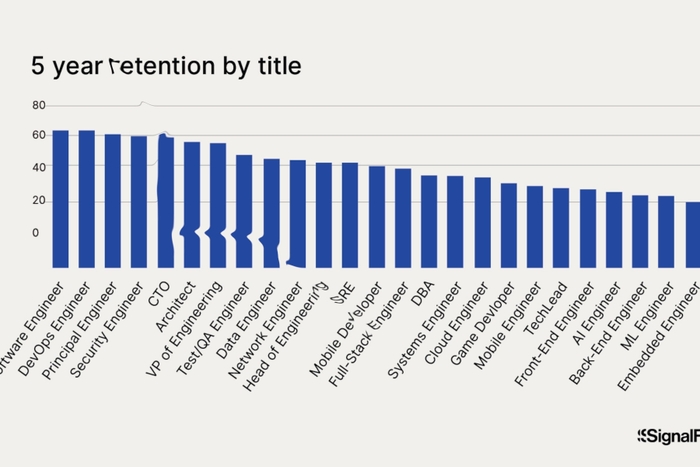Career Advice for Engineers: Think Startups and Data/AI
Nov 20, 2024
Career Advice for Engineers: Think Startups and Data/AI
While getting a job with a large engineering firm has for years been associated with the beginning of a upward career path, many successful engineers have chosen to take the riskier path of starting their own company or joining a startup. Now, a report by Silicon Valley venture capital firm SignalFire lends credence to the concept of engineers striking it out on their own.
The report, aimed at engineers of all levels, came up with these top-level insights:
-
In their last job transition, only 2.7% of big tech engineers moved to a smaller startup, where they would be promoted 22% faster and can earn potentially life-changing equity.
-
Engineers from top-tier universities reach senior positions 22% faster than those from other schools, but prestigious schooling means little over the long run, with only 3% more top-tier engineers reaching a senior position by year eight of their career.
-
Data engineering roles see the fastest progression to leadership.
-
Contrary to rumors, AI isn’t yet shrinking the engineering workforce. Instead, the number of engineers continues to grow, and "ML/AI engineer" is the fastest-growing engineering role, growing more than 2,770% in the last 10 years.
Using its Beacon AI data platform, SignalFire tracked carrier mobility among engineers, which includes moves to different companies, changes in roles, and lateral moves within a firm. The platform tracked the number of job transitions, duration in roles, and how quickly engineers moved into senior positions. It tracked job change across 10 to 20 years of engineering data.
Related:Top Engineering Job Posting Sites
Smaller firms fast track to promotions
The study found that whether in large companies or startups, with far fewer transitions between the two. However, the study found that mobility can unlock new career growth opportunities for engineers, including unlocking higher earning potential.
In particular, SignalFire suggests that engineers in startups can often experience quicker promotions, especially in the early stages of their careers, getting promoted 22% faster than those at larger companies. Startups, with their flat hierarchies and immediate need for problem solvers, offer more opportunities to take on leadership roles earlier than in large corporations. The fast pace and flexibility of these companies mean engineers can wear many hats, rapidly gaining diverse experiences that might take years to accumulate in larger organizations.
The study found that startups have an average of 2.1 years between promotions, significantly shorter than more traditional companies like, which average 3.18 years.
Related:Are These Jobs Viable for Engineering Career Changes?
School matters when one starts out
Does getting that engineering training at a top-tier college matter? To a point. According to the study, of the engineers who reach senior roles, those who graduated from top-tier programs tend to get there more quickly. On average, these engineers take about 22% less time to reach seniority than their peers from other schools. This early-career advantage is largely due to access to prestigious companies, strong networks, and advanced educational opportunities.
But those advantages disappear over time. The study found that as careers progress, the gap between engineers from top-tier schools and those from other universities widens slightly but remains very small. Experience and adaptability become more important factors in career mobility, with many engineers from non-top-tier schools reaching senior positions just a few years later than their top-tier counterparts.
Tech history is rich with stories about the college dropouts who, despite their incomplete formal education, become successful engineers and tech entrepreneurs. One of the study’s most striking findings is the significant upward mobility for engineers without formal degrees. While it takes them longer to reach senior positions (an average of 5.37 years compared with 3.07 years for top-tier graduates), engineers without formal education have consistently demonstrated the ability to rise through the ranks, according to the study.
Related:15 Career Options for Electrical Engineers

Retention rates for various engineering roles. (SignalFire)
DevOps, Cloud are in
For engineers interested in upward mobility, one important factor driving career mobility is their field of specialization. According to the study, SignalFire found that the largest sectors hiring right now are Consumer, Enterprise SaaS, and FinTech. In these hot sectors, the emphasis is on practical skills rather than formal education. The study found that areas such as DevOps and cloud engineering in particular place a stronger emphasis on practical skills and experience than on formal education, while providing a path for upward mobility.
For instance, SignalFire found that DevOps engineers often transition into leadership roles such as site reliability engineers (SREs) or heads of infrastructure more quickly because of the critical nature of their work in maintaining systems and ensuring operational efficiency.
In a similar vein, the study found that data engineers are increasingly moving into leadership roles, particularly in areas of data strategy and architecture. Their expertise in managing and structuring data infrastructures positions them for upward mobility in leadership positions overseeing data operations.
According to the study, specialized fields such as DevOps, cloud engineering, and data engineering often have faster career mobility compared to more traditional fields like front-end or back-end development. These roles are not only in high demand but also require a highly technical skill set, which positions engineers to take on leadership roles more quickly.
Worried about AI? Don’t!
SignalFire also addressed the issue of Artificial Intelligence and whether it was threatening engineering jobs. On the contrary, it was creating more than an uptick in job openings. The study found that AI engineering job openings have increased by 2,700% since 2014, even outpacing fast-growing sectors such as cloud engineering and DevOps that have increased by 200%.
The study found that AI engineering and data engineering are where the most jobs are right now, suggesting that new college graduates work on their Python to have the best chance of getting hired quickly.